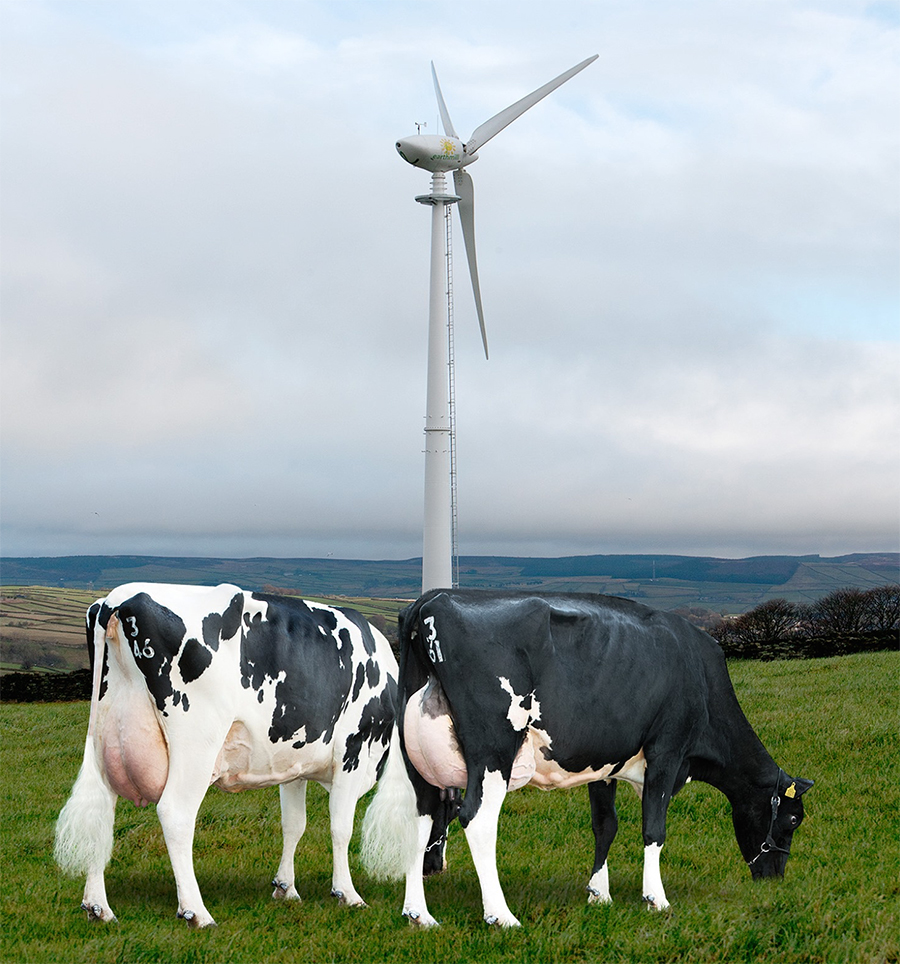
Market changes and uncertainty in the dairy sector have prompted a North Wales dairy farmer to turn to green energy.
Like many farmers, Aled Morris had been considering the effects that changes in farming support would have on his business. Reforms to the Single Farm Payment Scheme and, more recently, the demise of the milk quota, prompted Mr Morris to look at how the farm might benefit from an additional income stream.
Having decided to expand the herd at Marian Mawr near Rhyll, North Wales, he realised the farm’s existing single phase electricity supply was not going to support the360 head, 3.2m litres pa enterprise. Set against the backdrop of potential increases in milk supply and resulting market volatility, he knew the farm could be facing a challenging time - having to cover the costs of installing the three phase supply at a time of such uncertainty.
As for many dairy farmers, days are long and so any new area of business needed to be fairly self-sufficient, requiring little time input from Aled and the farm staff. Given the farm’s location only 7 miles from the coast, and the frequently windy conditions, a wind turbine seemed the ideal solution. Having recently installed the three phase electricity supply, Aled knew that a turbine would be a feasible option – something the old, single-phase supply would not have supported.
Aled explained: “We’re all very busy on the farm; the dairy starts at 4am and, in summer, we often don’t finish until late at night - then there’s the checking of the herd every night and the young stock to look after. We’re quite a labour-intensive farm, being spread across three sites, so we knew we physically couldn’t spend any time on whatever solution we came up with.
“Although we needed the three-phase supply for the bigger dairy, to expect the business to carry that cost would have been very tough. Seeing the turbines out at sea, as we do from the farm, we thought that a turbine on the farm was the obvious answer.”
The family researched a number of diversification ideas but decided some form of renewable energy scheme would be the best fit, by providing an additional income with little or no maintenance while also reducing the farm’s energy bills.
“We looked at solar but as we’re often working in the dark, especially in the winter, we need the flexibility of having power that can be generated at any time of day. We thought about what natural assets we have to take advantage of. We’re just inland from a little valley that runs up from the coast and the wind tunnels up it from the sea, towards us, so we thought we probably had the ideal location for a wind turbine,” Aled added.
Steve Milner, managing director of Earthmill, a specialist farm-scale wind turbine installation business based in Wetherby, Yorkshire, said: “We always do very thorough research to make sure a location is suitable for a wind turbine – it’s in everybody’s interests that a turbine is operational for the majority of the time – and Marian Mawr certainly meets the criteria.”
“The farm will also be future-proofed against rising electricity costs by becoming a green energy generator, as well as diversifying the business at this difficult time.”
When operational, the wind turbine will generate sufficient energy to supply the dairy unit and also sell excess back to the grid – giving the farm extra revenue to reinvest in the business.
Aled said: “We are asking more and more from our cows as yields improve and we want to reinvest in improving their working conditions – as well as for our staff! The extra income from the wind turbine will pay for the three-phase supply and also help us reinvest in the farm.
“Even if we have some days when there isn’t enough wind for the turbines to turn and we need to use energy from the grid, taken across the year, we should still be in profit. It’ll be good to have the extra injection of cash into the business each quarter.”
Earthmill will be installing an Endurance E-3120 turbine on Aled’s farm. Modest in size, the 55Kw turbine is capable of producing up to 250,000kWh pa, making it ideal for farms with high power requirements. The generator operates at a low level resistance, allowing the turbine to start producing energy at a wind speed of just 3.5 m/s and is so efficient that it frequently out performs higher rated turbines.
Having just received permission for the 36m turbine, Aled noted: ““Being in an AONB, the planning process has been a bit more complex but Earthmill have been really supportive - they know what they are talking about and have the expertise and experience. We’d considered our neighbours from the outset – and that was one of the reasons why we chose Earthmill, because the turbines they supply are so quiet – and they’ve been very understanding.”
